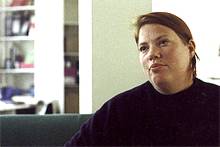 Lucy, tell us about the script factory.
The Script Factory is a development and training organisation. We work mainly with new writers and our core activity is selecting scripts from a completely open submission and presenting them at a reading. A bit of a bonkers idea that we had about 5 or 6 years ago, very common for plays but completely unheard of for film scripts. As we started out we realised that it was not only a very entertaining thing but also that it was a very intense development process for the script because you can tell what will and what won't work. It's obviously not brilliant for the visual stuff but it's excellent for the structure, characters and the relationships between them. In the first year we worked with scripts that we knew weren't going to be made but tried to create a new audience and a new art form. It ended up being rather frustrating for the audience because that was it really, it was somewhere between a play, a radio play and a film.
So you only bring together a writer and a director, no producers?
Not necessarily, the scripts can come to us at any stage - with a director and producer attached or on their own and then we get a casting director involved. We ask the writer to do a reading draft so that it's easier to listen to.
Where does all this take place?
We do the readings at the Soho Theatre on Dean Street in London but we also have a fairly huge regional programme. We tend to do the out of town events as attachments to film festivals where there'll be a definite film audience attending. The Factory has grown within the last year because we started out as a project within the BFI but when the whole public sector was re structured we, as they liked to put it, 'achieved our independence' - our experience was that we were kicked out rather ungraciously. We had the choice of closing down or scaling up and we scaled up. We turned it into a business, that's an achievement we are pretty proud of, we turned a tiny little training programme that was very admin heavy into…well I think we'll turn over a quarter of a million this year.
Did you say that you'll take scripts from anywhere?
Yes but we don't advertise, you have to find us because if we put an ad in the Guardian we'd have thousands coming in. We get between 800 and 1000 a year and whenever we do anything even remotely profile like a masterclass we get another rush of entries. In general, those that come to us have correctly formatted scripts with an idea that they seem to be following through.
How do you get the casting directors involved?
I don't know and God love them for it. We talk to the writers about their dream cast and they just check the availability, we write the letters and send them out so there's not an enormous amount of work for them apart from the thought involved. I think they just enjoy it.
How did you get involved in this?
It's a combination of my various passions, film and story have been life long passions. I'd been running events and Charlotte, my partner in the business had suddenly successfully pitched a project but had never ran events so we were introduced by a mutual friend. Charlotte was working on a similar but much more casual project in New York where writers and actors would gather in a café and do extracts and readings. She brought it back and saw it as a really fantastic development tool so it was one of those moments when I thought my life had been really blessed.
How long has it been going now?
We are into our 6th year now. We also do a lot of masterclasses, and training - training in reading scripts where there was a big gap. We began to offer reports back to writers, based on our belief that there was no infrastructure for writers in the UK film industry at all, we decided to offer feedback because they were of a reasonably high standard. |